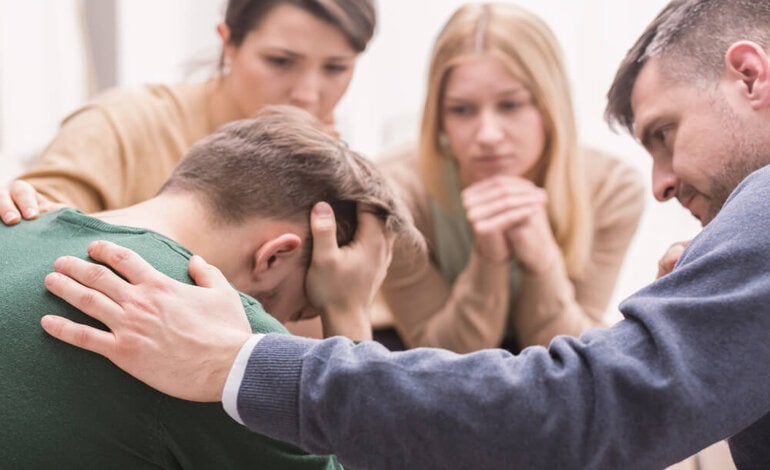Everyone will most likely agree that establishing friends in childhood is much easier than building friendships in adulthood. Children are more innocent, less judgmental, and will bond over the simplest things like stickers and orange crayons.
As individuals age, they become more stuck in their ways. However, no matter what age, friendships, and social bonding are extremely important for mental health.
Loneliness can harvest low self-esteem, depression, and anxiety. Loneliness is also linked to high blood pressure and cognitive decline. Loneliness is tightly connected to life transitions such as moving away from home, starting a new school or starting a new job.
Hence, building a new community in recovery can be challenging, but it is necessary.
Talking to your clients about the realities of integrating into a new community, the importance of combatting loneliness, and the challenges that he/she may endure can help clients understand the realities of what they may be facing. So how can we teach our clients to do this?
Jumping out of comfort zones
Meeting new friends and creating a community takes vulnerability and patience. It is essential to explain to your clients that the sense of “belonging” does not happen overnight. It requires showing up, taking the mask off, and practicing patience.
Showing up: This requires attending social events, talking to strangers, showing up to a community recovery meeting, becoming involved with hobbies or clubs.
Taking the mask off: Vulnerability can be challenging, but it is necessary to build genuine relationships. Sharing life events, interests, personal stories, and being honest with oneself and others can allow deeper connections.
Practicing patience: Meeting friends can often take longer than expected. It takes time to be willing to open up and venture out to new places. It also takes time to meet others with similar interests and values. It can take months and sometimes even a year to become integrated into a new recovery community.
Discovering new places and people
So where do people meet new friends? A good rule of thumb is integrating oneself into communities with like-minded people. It is natural to want to make friends who share the same interests, hobbies, and beliefs.
Find out what your client enjoys doing. Does he/she have any hobbies? Is he/she religious? Individuals are attracted to others who are happy and who share the same passions in life. Encouraging someone to join a music club to make friends when that person does not dance or play music will most likely not be a good fit. The Internet: The Internet is an excellent source of information and can be a great way to meet friends.
There are many chances to become involved in activity and community groups through social media. From book clubs and hiking clubs to church groups and cooking groups, social media can be a great way to connect with others in the local community.
The first meet and greet is always the most challenging, but once introductions are made, and barriers are broken, it can be easier to integrate into these communities.
Neighbors: Whether your client is living in a treatment center, community housing, or at home alone, saying hello and chatting with the neighbors is a great way to meet new people and become connected.
Hobbies: Encourage your client to become involved in a hobby, either within their alumni treatment group or in the community.
Volunteer: Acts of service within the community is a great way to meet friends. It is also a great way to give back and gain purpose in return.
Loneliness can breed desperation
Recovery, for the most part, is a new experience associated with independence and freedom. It is just as important to be mindful of peer pressure, dangerous behaviors, and negative people as it is to become friends with like-minded people. Loneliness has the potential to breed desperation, a need to interact with others, and make friends, regardless of the risks. Sometimes individuals will make poor choices and engage in unhealthy behaviors because they want to belong and feel accepted.
The best way to prevent this is to counsel your client on the importance of self-love and respect. Individuals who practice self-love and are comfortable spending time alone are more likely to have higher standards in regards to socializing with others. Talk to your clients about positive coping mechanisms, self-esteem, and positive traits to look for in relationships. Making the “wrong” friends can sometimes be worse than feeling alone.
“Owning our story can be hard but not nearly as difficult as spending our lives running from it. Embracing our vulnerabilities is risky but not nearly as dangerous as giving up on love and belonging and joy—the experiences that make us the most vulnerable. Only when we are brave enough to explore the darkness will we discover the infinite power of our light.”
― Brene Brown
We Are Here For You!
No matter where you are in your journey to recovery, AKUA Mind & Body can help. We understand that life in recovery can be tough. If you are afraid of a relapse, seeking help for the first time or trying to get back on track, we have a program for you.
We are committed to the health and safety of you and/or your loved ones, and we are FULLY OPEN & OPERATIONAL. At AKUA Mind & Body, the safety of our Clients is our top priority. We are aware of the increased fear and anxiety among most people regarding the current pandemic. Hence, we are doing everything that we can to keep healthfulness and safety.
If you or someone you love is struggling with a mental health illness or substance use and addiction disorder, we can help now more than ever! AKUA Mind & Body provides an integrative treatment approach with multiple levels of care from detox, residential to virtual outpatient programs. With several facilities throughout the Sacramento Region, Los Angeles & Orange County Region, and San Diego Region, we aim to provide our clients with a solid foundation for healing and transformation. Gender specific and Co-ed facilities available.
Call our 24/7 admissions helpline to seek help today!




